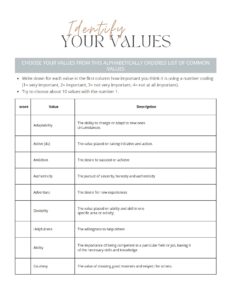Introduction
In previous blog posts, we explored the importance of a conscious parental identity, emphasized the value of a proactive attitude, and discussed the potential of proactive choices. We saw how a proactive approach can enhance our influence and impact on our environment. Now it’s time to look further and take the next step: determining our values.

Navigating to the Future
Due to the unpredictability and complexity of contemporary life, it can sometimes be difficult to determine which direction we should go. Fortunately, Stephen Covey provides a useful roadmap in his bestseller “The 7 Habits of Highly Effective People”. His second habit, ‘Begin with the End in Mind’, proves particularly powerful in this regard. This goes beyond merely setting goals. Deep reflection on what is important to us – our values – is a crucial prerequisite for satisfaction in achieving those goals.
Defining Goals and Values
Setting clear goals in our lives is essential. However, even more important than setting goals is reflecting on our values. They form the basis on which we set our goals. A goal that aligns with our values will ultimately provide the most satisfaction.
Climbing a Ladder Leaning Against the Wrong Wall
Proactivity and goal setting are valuable, but what if you’re climbing the ladder of life while it’s leaning against the wrong wall? What if, after years of hard work, you realize you haven’t seen your children grow up? To avoid this, it’s important to identify our personal values in advance and determine what they mean to us.
Difference Between Values and Goals
Goals are concrete, measurable achievements or results that we want to achieve. They can be checked off when they are reached. For example, running a marathon, writing a new book, or getting a promotion at work.
In contrast to goals, values are deeply rooted beliefs and principles that guide us in the choices we make. They form our moral compass and give direction to our life. Values such as integrity, compassion, or adventurousness, for example, are not time-bound or measurable.
The Role of Values in ‘Begin with the End in Mind’

Imagine a map with countless possible destinations. You choose a goal and determine your strategy to get there. But amidst unpredictability and changes, you need a constant – your values. Regardless of the route you choose, or the destinations you pursue, your values remain the same. They are your compass that helps you navigate through the challenges and opportunities that arise on your path. Values give you direction and purpose, even as your destinations and strategies change.
‘Begin with the End in Mind’ means not only defining your goals, but also understanding your values that guide these goals. So let’s recognize and appreciate our personal values.
Navigating Life with ‘Begin with the End in Mind’
Living in Alignment with Your Values
The sea of life can sometimes surprise us with calm waves, but also with fierce storms. In these unpredictable circumstances, we have control over our reactions. They are dependent on our values, the inner beliefs that guide us.
The Importance of Your Choice
Every moment, no matter how challenging, offers us a choice. We can decide to act according to our values, making decisions that resonate with our deepest principles. In the storm, for example, we choose courage over fear, perseverance over giving up, or compassion over indifference.
Your Values as a Compass
This freedom of choice gives us a sense of control and purpose, even in the most tumultuous times. Our inner compass – our values – guide us, regardless of the fierceness of the waves or the darkness of the sky.
A Value-Led Life versus a Pleasure-Oriented Life

A life led by values embraces the full spectrum of human experiences, including both joy and suffering. Instead of constantly pursuing happiness or avoiding discomfort, we strive for a life that is real and meaningful, aligned with our deepest values. Our values help us through challenging times, strengthen our character, and give our life depth and meaning.
In contrast, a pleasure-oriented life is focused on maximizing pleasure and minimizing discomfort, without necessarily considering our values. While this can provide short-term satisfaction, it can lead to superficiality and dissatisfaction in the long term.
Time to Identify Your Values

These two pathways, a life of values and a life of pleasure, are fundamentally different. The first path leads to a life of depth and fulfillment. The second can lead to a shallow and unfulfilled life. The first step in the ‘Begin with the End in Mind’ method is to define and articulate our values. Let’s get started!
Identifying Values: Begin with the End in Mind
Discovering Values with a Handy Table
In the worksheet ‘identify your values’, you will find a table with an alphabetically ordered list of common values, including their brief descriptions.
- For each value in the first column, note how important you find it using a numerical coding (1= very important, 2= important, 3= not so important, 4= totally unimportant).
- Try to choose about ten values with the number 1.
- See which values have a similar meaning. Can some be grouped?
- Form five value groups and give each group a name.
- Then answer two questions for each of the five value groups in the subsequent columns:
- How would you feel if you are truly satisfied with the extent to which you experience this value in your life?
- How would you feel if you are not satisfied with the extent to which you experience this value in your life?
- Then add up the scores for each value to determine your top five values.
- Describe each identified value in your own words. This helps you to gain a deeper understanding of the value and how you want to apply it in your life.
Begin with the End in Mind: Visualize Your Own Funeral
If you’re struggling to identify your values, consider this exercise from Covey: visualize your own funeral. How would you want people to remember you? What values would you want your life to have embodied?
- Imagine you’re attending your own funeral, three years from now.
- There are four speakers: a family member, a good friend, a colleague, and a member of your community.
- Each speaker shares their experiences about your life, character, contributions, and successes. What would you want them to say?
- Reflect on the values, achievements, and influences you want them to highlight in their speeches.
By visualizing how you want others to remember you, you can identify the values and goals that are most important to you. This gives you more clarity and focus on how you want to live and what you want to achieve.
Inspiring Values from Antiquity

Personally, I found inspiration for identifying my values in both Stoic and Buddhist philosophy. Hence, I’m sharing these as examples. Perhaps they will inspire you too!
Values of the Stoics
About 2000 years ago, Stoics like Epictetus and Seneca identified values that lead to happiness. Here are four that I admire:
- Wisdom (Sophia): Wisdom refers to developing insight and knowledge about the world and ourselves. It includes the ability to understand and accept the natural order of the universe, as well as the ability to form good judgments and act rationally.
- Courage (Andreia): Courage is not just about physical bravery, but also about moral courage. It means daring to follow the right path, even if it is difficult or seems contradictory. It’s about overcoming fear and steadfastly adhering to virtue.
- Moderation (Sophrosyne): Moderation is about self-control and balance. It involves controlling our desires, emotions, and drives, and finding a moderate and harmonious way of life. Moderation also means not getting carried away by excessive joy or sorrow, but instead striving for a calm and balanced state of mind.
- Justice (Dikaiosyne): Justice is about treating others fairly and justly. It involves respecting others, promoting equality, and acting in a way that is consistent with the moral principles of Stoicism. Justice also includes fulfilling our social obligations and contributing to the wellbeing of society.
Buddhist Values
Buddhism also has many values, of which these five are perhaps the most important:
- Compassion (Karuna): Compassion is a central value in Buddhism. It refers to the ability to show empathy and sympathy and to help others in their suffering. Buddhists strive to express compassion in their thoughts, words, and actions, both towards others and towards themselves.
- Loving-kindness (Metta): Loving-kindness is about nurturing a feeling of unconditional kindness and goodwill towards all living beings. It is the desire for the wellbeing and happiness of others and the pursuit of harmony and peaceful relationships.
- Equanimity (Upekkha): Equanimity refers to developing a balanced and impartial attitude towards all experiences and beings. It means not being attached to pleasant experiences or having aversion to unpleasant experiences. The aim is to cultivate inner stability and calm, regardless of changing circumstances.
- Ethics (Sila): Ethics plays a significant role in Buddhism. It includes adhering to the Five Precepts, which are guidelines for a moral and virtuous life. These precepts involve abstaining from killing living beings, stealing, sexual misconduct, lying, and the use of intoxicants that cloud the mind.
- Wisdom (Panna): Wisdom in Buddhism refers to developing insightinto the nature of suffering, its causes, and the path to liberation. It involves cultivating clear understanding, seeing through the illusions of the ego, and developing a deeper insight into reality as it is.
Conclusion
Reflection on Identifying and Defining Values
In this article, we’ve explored the importance of values in our lives. These invisible guidelines can assist in directing our actions and decisions, and achieving a meaningful and fulfilling life.
We’ve discovered a method to identify and define our personal values, using a handy table. We evaluated a list of values based on their importance, then selected and grouped the most crucial ones into five categories. The exercise of visualizing how we want to be remembered also helped us gain insight into which values we truly want to embody.
We also drew inspiration from the past by looking at the values embraced by the Stoics and Buddhism, which can still guide us today.
Looking Ahead to the Next Blog Post: The Wheel of Life
In the next blog post, we will apply these discovered values to find balance in all parts of our lives. We will use the wheel of life, a powerful tool that helps us get a picture of how balanced or unbalanced our life currently is.
Each part of the wheel represents a life domain, such as career, relationships, health, and personal growth. We will write out our vision for each of these domains, fueled by the values we have identified.
Remember, this is your life, and you determine the values that guide it. Curious about how to put this into practice? Be sure to stick around for the next blog post. Let’s strive together for a more balanced and value-oriented life!
Download the ‘identify your values’ worksheet

Want to Read or Watch More?
- Website: The Daily Stoic, Ancient Wisdom for Everyday Life, Ryan Holiday
- Books by Stephen Covey*
- Start with Why, by Simon Sinek*
*See the disclaimer at the bottom of this page








